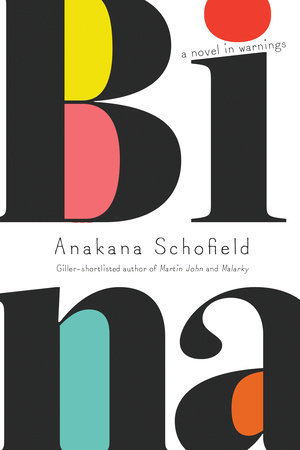
Bina: A Novel in Warnings
Anakana Schofield
Knopf Canada, 2019
Review by Marisa Grizenko
“Don’t arrive at the end of this tale insisting it was too long or too wide or too unlike you. I am not interested in appealing to you. I am not you. I am only here to warn you.” The gruff, no-nonsense voice issuing this caution belongs to Bina, the titular character of Vancouver writer Anakana Schofield’s new novel.
Bina’s goal is to warn others, women like herself presumably, from even thinking of doing as she’s done. Beleaguered and weary, 74-year-old Bina scribbles her warnings, her tale, on old receipts and scraps of paper. She’s aware of the futility of her testimony; after all, no one listens to her. “I’m not a young person,” she says, “so I am used to being ignored.”
When Bina: A Novel in Warnings begins, much has already happened, plot-wise, so while Bina makes a cup of tea or takes to her bed (“I am back in my bed. I will not be leaving it”), we read to catch up. Her intention is to tell the story straight, without any writerly ornament or complicated narration. Bina knows how others might handle her story. “Another woman,” she writes, “she’d lace up paragraphs that would absorb you and you’d believe her, because you’re easy this way.” In spite of her intentions, though, Bina’s story is far from straightforward. Her narrative, doled out piece by piece, is a collection of enigmatic statements and hints that gradually reveals the situation in which Bina finds herself. Short, declarative sentences are laid out on the page—a rhythmic, hypnotic poetics of complaint.
Bina’s warnings revolve around two men. There’s Eddie, a man Bina once helped, who repaid her kindness by moving in for ten years, turning her property into a junkyard, and threatening her with physical violence. There’s also the Tall Man, an elusive figure who leads the Group, an organization promoting assisted dying (Bina’s become one of their volunteers). Much of the humour and pathos of Bina’s story is that for a woman with such small ambitions and desires—a cup of tea, a house free of Eddie—she manages to find herself entangled in many larger narratives. Tagging along to an anti-war protest, we learn, Bina surprised everyone by taking a hammer to a plane, imagining “knocking out every one of Eddie’s teeth.” Now “the Crusties” are camped outside her door, unwelcome champions of Bina’s (unintended) activism. Before he left Ireland to run off to Canada, Eddie had posted hateful messages on the Internet, so the phone rings at all hours with angry strangers on the other line. When it’s not them, it’s Bina’s solicitor or a woman from the Group. “Now I’ve the socialists, the Marxists, the laryngists and the mangle-ists signing permissions and petitions to free me,” Bina complains. All she wants is some peace. One person who never calls, though, is Phil, her dear, dear friend. Phil is dead, and Bina is accused of having helped her die.
Like in Schofield’s earlier novels, 2012’s Malarky and 2015’s Martin John, Bina is delightfully, darkly funny and seems to have a distinctly Irish sensibility. The language is both conversational and deeply inventive. It succeeds completely at bringing us into Bina’s world: “There’s a new fella out there,” she says, “the lanky looper I call him, with a thin face and a long beard that might have food gone relic inside it.” Beneath the humour, though, is some real pain. Not only does Bina still fear Eddie, not only does she feel confused about the chain of events that’s led her here, but she’s also lost Phil. The novel’s playfulness and off-kilter logic call to mind the work of Samuel Beckett, while Bina’s voice feels straight out of a Lydia Davis story (Bina: “Would there be any chance…? No! There’s no chance. None. None. None.”). However, in terms of Bina’s relationship with Phil, all I could think of was Miriam Toews’ All My Puny Sorrows, a novel that powerfully asks whose desires matter when it comes to life and death? Toews’ narrator says of her suicidal sister, “She wanted to die and I wanted her to live and we were enemies who loved each other.” Bina similarly finds herself caught: she has helped people die, believes in their right to die, yet when Phil’s the one asking for assistance, Bina can’t quite bring herself to give it.
The novel is a moving portrait of a friendship and the complicated calculations, ethical and interpersonal, that attend to witnessing another’s pain. As for her pain? Bina, by necessity, becomes her own witness, using writing to exercise her agency. She’s old, physically weakened, and prone to confusion, and yet she’s determined to tell her story and set the record straight. I began the book amused by Bina’s brusque manner, her cynicism and misanthropy, but I ended it feeling emotionally devastated. Bina may be a novel of warnings, but what it ultimately warns us of is the messiness, heartbreak, and, yes, humour that comes with existence. Bina is a comic and affecting cri de coeur from one of society’s ignored.
Marisa Grizenko is a writing consultant and editor based in Vancouver, BC.